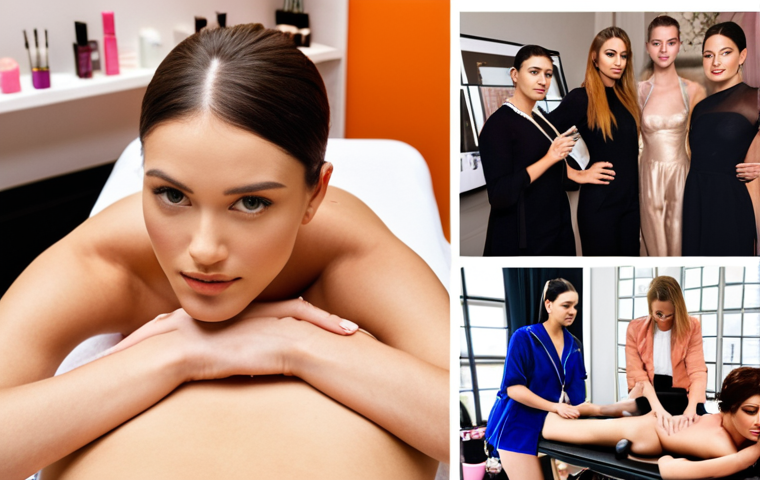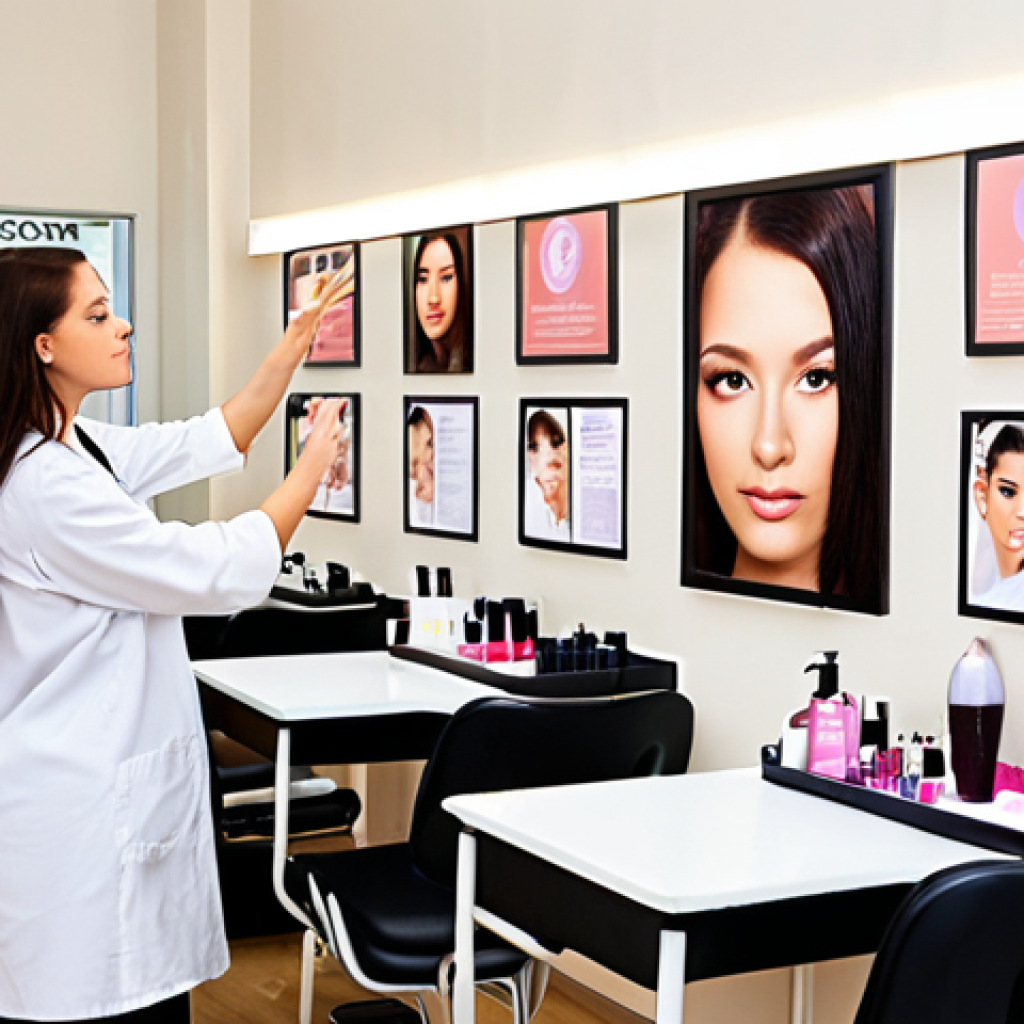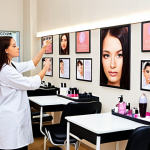Ever wondered if that beauty certification you’re eyeing holds real weight across borders? As someone deeply involved in the beauty industry, I’ve seen firsthand how international credentials can open doors to exciting opportunities, from working in high-end salons abroad to teaching cutting-edge techniques.
Navigating the world of cosmetology certifications can be tricky, with each country having its own set of standards and requirements. But, getting a respected international certification can seriously boost your career.
Think globally certified colorists, stylists sought after in major fashion capitals – that could be you! Let’s dive in to learn exactly what these certifications are all about.
Here’s the content:Okay, let’s get into the nitty-gritty of global beauty cred.
Decoding the Confusing World of Beauty Certifications

Navigating the landscape of beauty certifications can feel like trying to decipher an ancient code. There are so many options, each promising to be the key to unlocking your dream career.
I remember when I first started looking into certifications; I was completely overwhelmed. The trick is to break it down and understand what each certification truly offers and how it aligns with your career goals.
Understanding Accreditation Bodies
Think of accreditation bodies as the gatekeepers of quality in the beauty industry. They evaluate certification programs to ensure they meet specific standards.
For instance, CIDESCO (Comité International d’Esthétique et de Cosmétologie) is a globally recognized accreditation body that sets high benchmarks for beauty therapy and cosmetology.
Earning a certification from a CIDESCO-accredited school is like having a gold star on your resume. It signals to potential employers that you’ve received top-notch training.
The Importance of Research
Before you commit to a certification program, do your homework. Find out which certifications are most respected in your area of expertise and the countries where you aspire to work.
Talk to professionals who have the certifications you’re considering and ask about their experiences. What did they learn? How has the certification impacted their career?
This kind of inside information can be invaluable.
Spotlight on Key International Certifications
There are a handful of international certifications that hold considerable weight in the beauty industry. These certifications are often recognized across multiple countries and can significantly enhance your career prospects.
I’ve personally seen how having one of these certifications can open doors to opportunities that would otherwise be out of reach.
CIBTAC (Confederation of International Beauty Therapy and Cosmetology)
CIBTAC is a UK-based awarding body that offers a range of qualifications in beauty therapy, spa therapy, and related fields. CIBTAC certifications are highly respected in the UK and other Commonwealth countries.
If you’re planning to work in a spa or wellness center, a CIBTAC certification can give you a competitive edge.
ITEC (International Therapy Examination Council)
ITEC is another UK-based awarding body that offers a wide range of qualifications in beauty therapy, complementary therapies, and sports massage. ITEC certifications are recognized in over 40 countries, making them a valuable asset for anyone seeking to work abroad.
ITEC qualifications often include practical assessments, ensuring that graduates have the skills needed to succeed in the real world.
Navigating Country-Specific Requirements
One of the biggest challenges of working in the beauty industry internationally is understanding the specific requirements of each country. What might be acceptable in one country could be completely invalid in another.
Trust me, I’ve seen it happen. You absolutely have to do your research!
Licensing Variations
Licensing requirements for beauty professionals vary significantly from country to country. In some countries, you may need to pass a local licensing exam in addition to holding an international certification.
In others, your international certification may be enough to qualify you for a license. It’s crucial to check with the relevant licensing authorities in the countries where you plan to work.
Visa Considerations
Even if you have the right certifications and licenses, you’ll still need to obtain the necessary visas to work in a foreign country. The visa process can be complex and time-consuming, so it’s best to start early.
You may need to provide proof of your qualifications, work experience, and language proficiency.
The Financial Implications of International Certifications
Investing in an international certification is a big decision, and it’s important to consider the financial implications. The cost of the certification program itself, as well as travel, accommodation, and exam fees, can add up quickly.
However, the potential return on investment can be significant.
Upfront Costs vs. Long-Term Gains
While the upfront costs of an international certification may seem daunting, it’s important to weigh them against the potential long-term gains. A reputable certification can lead to higher earning potential, more job opportunities, and greater career satisfaction.
I know people who have doubled or even tripled their income after obtaining an international certification.
Exploring Funding Options
There are a number of funding options available to help you finance your international certification. You may be eligible for scholarships, grants, or loans.
Some employers may also be willing to sponsor your training. It’s worth exploring all of your options to make your dream of an international career a reality.
Building a Global Beauty Career: My Personal Tips
Over the years, I’ve learned a few things about building a successful beauty career on a global scale. It’s not always easy, but with the right mindset and strategies, you can achieve your goals.
These are some of the tips that helped me.
Networking is Key
Networking is essential for building connections and finding opportunities in the global beauty industry. Attend industry events, join online communities, and reach out to professionals who are working in the countries where you want to work.
Don’t be afraid to ask for advice or mentorship.
Embrace Continuous Learning
The beauty industry is constantly evolving, so it’s important to embrace continuous learning. Stay up-to-date on the latest trends, techniques, and technologies.
Attend workshops, conferences, and online courses to expand your knowledge and skills.
Showcasing the Value: Examples of International Certifications and Their Benefits
To give you a clearer picture, let’s look at some specific examples of international certifications and the benefits they offer:
| Certification | Issuing Body | Typical Benefits |
|---|---|---|
| CIDESCO Diploma | CIDESCO International | Globally recognized, enhances credibility, opens doors to high-end spas and salons |
| CIBTAC Diplomas | CIBTAC | Highly respected in the UK and Commonwealth countries, focuses on practical skills |
| ITEC Qualifications | ITEC | Recognized in over 40 countries, broad range of therapies covered |
Avoiding Common Pitfalls in Your Global Journey
Embarking on an international career path isn’t without its challenges. Here are some common pitfalls I’ve observed over the years and tips to avoid them.
Language Barriers
One of the most common challenges is dealing with language barriers. Even if you speak some of the local language, you may still struggle to communicate effectively in a professional setting.
Consider taking language classes or working with a translator.
Cultural Differences
Cultural differences can also be a source of misunderstanding and frustration. Take the time to learn about the local culture and customs. Be respectful of local traditions and be open to adapting your communication style.
Decoding the Confusing World of Beauty Certifications
Navigating the landscape of beauty certifications can feel like trying to decipher an ancient code. There are so many options, each promising to be the key to unlocking your dream career. I remember when I first started looking into certifications; I was completely overwhelmed. The trick is to break it down and understand what each certification truly offers and how it aligns with your career goals.
Understanding Accreditation Bodies
Think of accreditation bodies as the gatekeepers of quality in the beauty industry. They evaluate certification programs to ensure they meet specific standards. For instance, CIDESCO (Comité International d’Esthétique et de Cosmétologie) is a globally recognized accreditation body that sets high benchmarks for beauty therapy and cosmetology. Earning a certification from a CIDESCO-accredited school is like having a gold star on your resume. It signals to potential employers that you’ve received top-notch training.
The Importance of Research
Before you commit to a certification program, do your homework. Find out which certifications are most respected in your area of expertise and the countries where you aspire to work. Talk to professionals who have the certifications you’re considering and ask about their experiences. What did they learn? How has the certification impacted their career? This kind of inside information can be invaluable.
Spotlight on Key International Certifications
There are a handful of international certifications that hold considerable weight in the beauty industry. These certifications are often recognized across multiple countries and can significantly enhance your career prospects. I’ve personally seen how having one of these certifications can open doors to opportunities that would otherwise be out of reach.
CIBTAC (Confederation of International Beauty Therapy and Cosmetology)
CIBTAC is a UK-based awarding body that offers a range of qualifications in beauty therapy, spa therapy, and related fields. CIBTAC certifications are highly respected in the UK and other Commonwealth countries. If you’re planning to work in a spa or wellness center, a CIBTAC certification can give you a competitive edge.
ITEC (International Therapy Examination Council)
ITEC is another UK-based awarding body that offers a wide range of qualifications in beauty therapy, complementary therapies, and sports massage. ITEC certifications are recognized in over 40 countries, making them a valuable asset for anyone seeking to work abroad. ITEC qualifications often include practical assessments, ensuring that graduates have the skills needed to succeed in the real world.
Navigating Country-Specific Requirements
One of the biggest challenges of working in the beauty industry internationally is understanding the specific requirements of each country. What might be acceptable in one country could be completely invalid in another. Trust me, I’ve seen it happen. You absolutely have to do your research!
Licensing Variations
Licensing requirements for beauty professionals vary significantly from country to country. In some countries, you may need to pass a local licensing exam in addition to holding an international certification. In others, your international certification may be enough to qualify you for a license. It’s crucial to check with the relevant licensing authorities in the countries where you plan to work.
Visa Considerations
Even if you have the right certifications and licenses, you’ll still need to obtain the necessary visas to work in a foreign country. The visa process can be complex and time-consuming, so it’s best to start early. You may need to provide proof of your qualifications, work experience, and language proficiency.
The Financial Implications of International Certifications
Investing in an international certification is a big decision, and it’s important to consider the financial implications. The cost of the certification program itself, as well as travel, accommodation, and exam fees, can add up quickly. However, the potential return on investment can be significant.
Upfront Costs vs. Long-Term Gains
While the upfront costs of an international certification may seem daunting, it’s important to weigh them against the potential long-term gains. A reputable certification can lead to higher earning potential, more job opportunities, and greater career satisfaction. I know people who have doubled or even tripled their income after obtaining an international certification.
Exploring Funding Options
There are a number of funding options available to help you finance your international certification. You may be eligible for scholarships, grants, or loans. Some employers may also be willing to sponsor your training. It’s worth exploring all of your options to make your dream of an international career a reality.
Building a Global Beauty Career: My Personal Tips
Over the years, I’ve learned a few things about building a successful beauty career on a global scale. It’s not always easy, but with the right mindset and strategies, you can achieve your goals. These are some of the tips that helped me.
Networking is Key
Networking is essential for building connections and finding opportunities in the global beauty industry. Attend industry events, join online communities, and reach out to professionals who are working in the countries where you want to work. Don’t be afraid to ask for advice or mentorship.
Embrace Continuous Learning
The beauty industry is constantly evolving, so it’s important to embrace continuous learning. Stay up-to-date on the latest trends, techniques, and technologies. Attend workshops, conferences, and online courses to expand your knowledge and skills.
Showcasing the Value: Examples of International Certifications and Their Benefits
To give you a clearer picture, let’s look at some specific examples of international certifications and the benefits they offer:
| Certification | Issuing Body | Typical Benefits |
|---|---|---|
| CIDESCO Diploma | CIDESCO International | Globally recognized, enhances credibility, opens doors to high-end spas and salons |
| CIBTAC Diplomas | CIBTAC | Highly respected in the UK and Commonwealth countries, focuses on practical skills |
| ITEC Qualifications | ITEC | Recognized in over 40 countries, broad range of therapies covered |
Avoiding Common Pitfalls in Your Global Journey
Embarking on an international career path isn’t without its challenges. Here are some common pitfalls I’ve observed over the years and tips to avoid them.
Language Barriers
One of the most common challenges is dealing with language barriers. Even if you speak some of the local language, you may still struggle to communicate effectively in a professional setting. Consider taking language classes or working with a translator.
Cultural Differences
Cultural differences can also be a source of misunderstanding and frustration. Take the time to learn about the local culture and customs. Be respectful of local traditions and be open to adapting your communication style.
Wrapping Up
So, there you have it – a comprehensive guide to navigating the world of international beauty certifications. I hope this has demystified the process and given you the confidence to pursue your global career dreams. Remember, a little research and preparation can go a long way in helping you achieve your goals. Good luck!
Handy Tips to Know
1. Always verify the accreditation of the certification body. Don’t just take their word for it; look for independent verification.
2. Network with professionals who hold the certifications you’re considering. Ask about their experiences and whether they found the certification to be worthwhile.
3. Research the licensing requirements in the countries where you plan to work. Contact the relevant licensing authorities for up-to-date information.
4. Consider taking language classes to improve your communication skills. Even a basic understanding of the local language can make a big difference.
5. Be open to adapting your communication style to suit different cultures. What’s considered polite in one country may be considered rude in another.
Key Takeaways
International beauty certifications can significantly boost your career prospects.
Accreditation bodies ensure the quality of certification programs.
Country-specific licensing requirements vary and must be researched.
Networking and continuous learning are crucial for a global career.
Language and cultural barriers can be overcome with preparation and adaptation.
Frequently Asked Questions (FAQ) 📖
Q: What exactly does an “international” beauty certification mean, and why should I bother getting one?
A: Okay, so when we talk about an “international” beauty certification, we’re not talking about some magical, one-size-fits-all pass that instantly makes you a superstar everywhere.
Instead, think of it as a widely recognized credential that meets certain global standards and demonstrates a level of competency that’s respected across different countries.
It’s like having a really solid foundation that allows you to build a career pretty much anywhere. Why bother? Well, I’ve seen it open doors for stylists wanting to work in London salons, makeup artists aiming for jobs on international film sets, and estheticians dreaming of running their own spa in the Caribbean.
It shows potential employers (or clients!) that you’ve invested in your skills and are serious about your craft. Plus, it can significantly increase your earning potential!
Q: How do I figure out which international certification is the “right” one for my specific area of beauty, like hairstyling or nail tech?
A: This is a great question because not all certifications are created equal, right? My advice is to first pinpoint exactly where you want to go with your career.
Are you dreaming of working in a high-end salon in Paris? Then research which certifications are recognized and highly regarded in France. Start by looking at organizations like CIDESCO for esthetics or Intercoiffure Mondial for hairstyling.
Contact salons you admire and straight-up ask them what credentials they value. It might sound a little forward, but trust me, people in the industry are usually pretty helpful.
Also, consider the specific skills you want to master. Some certifications focus on color techniques, others on skincare, and still others on salon management.
Do your homework and match the certification to your goals. Don’t just go for the easiest or cheapest option.
Q: I’ve heard some international certifications are crazy expensive and time-consuming. Is it really worth the investment, and are there any more affordable alternatives?
A: You’re absolutely right; some of these certifications can be a real financial commitment, not to mention a big time investment! It’s definitely a valid concern.
“Worth it” really depends on your individual circumstances and career aspirations. If your ultimate goal is to work at, say, a prestigious spa in Switzerland, then the investment in a reputable, internationally recognized certification could pay off big time in the long run.
However, don’t despair if your budget is tight. Consider starting with smaller, more focused certifications that are still respected within the industry.
Look into online courses from reputable beauty schools or workshops offered by experienced professionals. These can be a great way to build your skills and network without breaking the bank.
Also, many beauty brands offer certifications for their products and techniques, which can be a great addition to your resume and often come with a lower price tag.
Build your way up. A solid portfolio and strong referrals can often be just as valuable as a fancy certificate!
📚 References
Wikipedia Encyclopedia
구글 검색 결과
구글 검색 결과
구글 검색 결과
구글 검색 결과
구글 검색 결과

